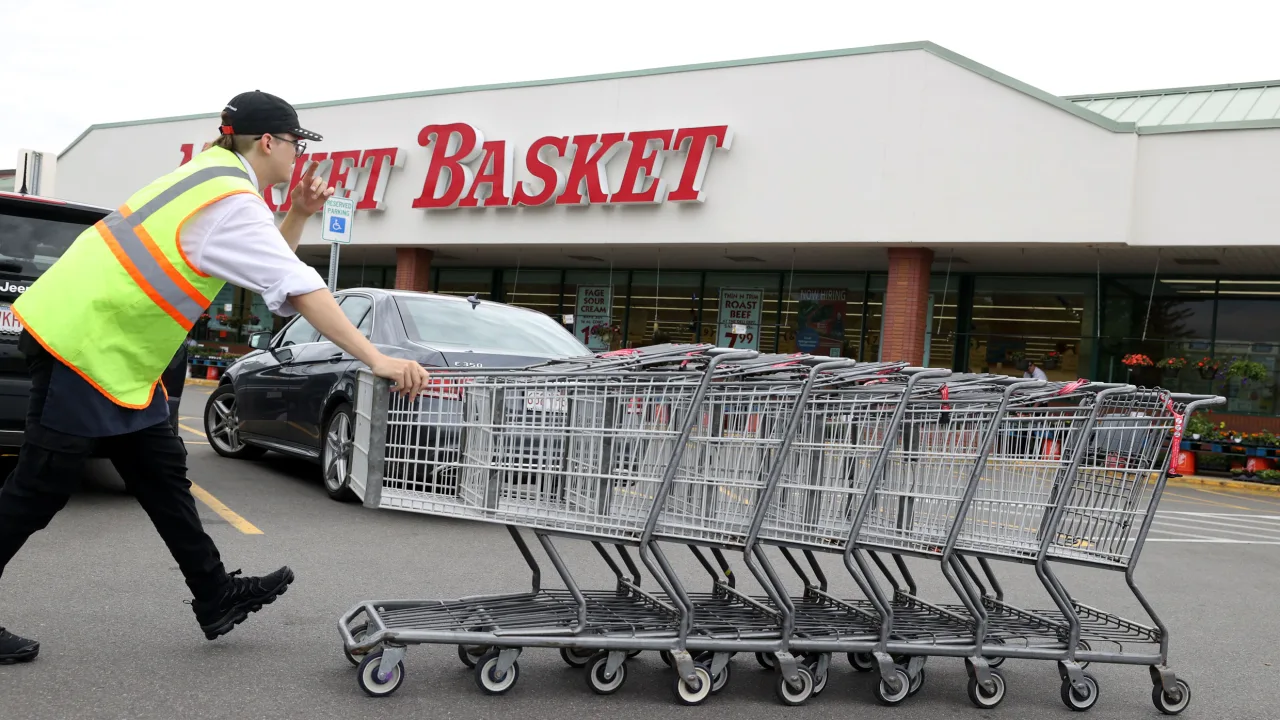What Market Basket’s labor tension reveals about Gen Z
“Honestly, I don’t even remember the 2014 situation. It just seems like it’s asking a lot of the employees. Why’s it on us?”— Gen Z Market Basket employee, June 2025 Ten years ago, Market Basket—a New England-based grocery chain—became a national symbol of grassroots worker solidarity. Thousands of nonunion employees staged a dramatic walkout to protest the ousting of their CEO, Arthur T. Demoulas. Customers followed suit, boycotting stores. Shelves emptied. The message was clear: people, not just profits, mattered. And it worked. Demoulas was reinstated, and Market Basket’s culture of loyalty was hailed as a case study in bottom-up leadership. Now, in 2025, Demoulas has been placed on administrative leave, and tensions are beginning to stir again. But something feels different. The energy is quieter. The loyalty less certain. And for good reason: the workforce has changed. A different kind of commitment Most of Market Basket’s current front-line employees are millennials or Gen Z. Many of them weren’t even in high school in 2014. And unlike the prior generation, they didn’t come up in a workplace culture that promised stability, pensions, or upward mobility. They came of age during mass layoffs, the pandemic, and a decade of seeing “essential” workers celebrated rhetorically—but often left unsupported. When I spoke with a Gen Z employee this week, their perspective was both honest and revealing. “There’s no way I really care about the long-term health of the company. I’m not going to work here for life. However, I do care about the people I work with—and the affordable prices. I’m torn.” The comment wasn’t true apathy, but a different kind of commitment. Fairness, clarity, and a voice As a leadership researcher and business school lecturer who focuses on generational dynamics, I’ve seen this mindset across industries. Gen Z doesn’t reject work ethic—but they do reject blind loyalty. They want to contribute, but they also want fairness, clarity, and a sense that their voice matters. They’re less likely to organize around a charismatic executive and more likely to organize around shared values or people in their immediate circle. When I asked this employee what empathy looks like to them at a moment like this, their answer wasn’t about the company—it was about the customer. “We have a lot of people who are elderly and can’t afford to go anywhere else. That actually makes it harder, because we can stay open for them—or walk out and hope that we can keep MB the way it is long term.” That response reflects a major evolution in how younger workers see the workplace. It’s not about “company man” culture—it’s about what’s humane, what’s sustainable, and who’s affected. Why this matters to leaders In 2014, Market Basket’s walkout became iconic because it was so rare: a coordinated labor action without a union, driven by a deep emotional connection to leadership. It represented a kind of institutional loyalty that’s becoming less common—not just at grocery stores, but across industries. Today, we’re seeing a different dynamic. Gen Z workers are still willing to take a stand—but it’s not always the kind of stand companies expect. Some may walk out. Others may opt for “quiet quitting,” high turnover, or organizing through digital platforms instead of picket lines. Their actions are no less meaningful, but they’re often less visible—and that can leave organizations flat-footed if they’re not paying attention. In my research and classroom discussions, I see Gen Z define loyalty not as longevity, but as values alignment. They will go to bat for coworkers. They’ll support customers and communities. But they expect the same in return from leadership. And if they don’t get it, they won’t stick around—especially not to fix systems they didn’t break. That creates a new challenge for employers: building workplace cultures that don’t rely on legacy loyalty, but earn trust in real time. The risk of expecting too much The 2014 Market Basket strike succeeded because workers and customers felt united. But this time around, younger workers are more skeptical—not just of leadership, but of the idea that change depends solely on their willingness to sacrifice. “Why’s it on us?” the employee asked. That’s the generational rift in a single sentence. Many younger employees have watched companies brand themselves as family until times get tough. They’ve seen layoffs announced over email, burnout go unacknowledged, and corporate promises ring hollow. So, when they’re asked to “do the right thing” for an employer, they ask—reasonably—what the company is doing for them. And yet, they still care. They care about fairness. They care about their team. They care about the elderly shopper who relies on affordable produce. That tension is exactly where Gen Z sits: morally aware, emotionally intelligent, and structurally exhausted. What comes next If a walkout happens again

“Honestly, I don’t even remember the 2014 situation. It just seems like it’s asking a lot of the employees. Why’s it on us?”
— Gen Z Market Basket employee, June 2025
Ten years ago, Market Basket—a New England-based grocery chain—became a national symbol of grassroots worker solidarity. Thousands of nonunion employees staged a dramatic walkout to protest the ousting of their CEO, Arthur T. Demoulas. Customers followed suit, boycotting stores. Shelves emptied. The message was clear: people, not just profits, mattered. And it worked. Demoulas was reinstated, and Market Basket’s culture of loyalty was hailed as a case study in bottom-up leadership.
Now, in 2025, Demoulas has been placed on administrative leave, and tensions are beginning to stir again. But something feels different. The energy is quieter. The loyalty less certain. And for good reason: the workforce has changed.
A different kind of commitment
Most of Market Basket’s current front-line employees are millennials or Gen Z. Many of them weren’t even in high school in 2014. And unlike the prior generation, they didn’t come up in a workplace culture that promised stability, pensions, or upward mobility. They came of age during mass layoffs, the pandemic, and a decade of seeing “essential” workers celebrated rhetorically—but often left unsupported.
When I spoke with a Gen Z employee this week, their perspective was both honest and revealing.
“There’s no way I really care about the long-term health of the company. I’m not going to work here for life. However, I do care about the people I work with—and the affordable prices. I’m torn.”
The comment wasn’t true apathy, but a different kind of commitment.
Fairness, clarity, and a voice
As a leadership researcher and business school lecturer who focuses on generational dynamics, I’ve seen this mindset across industries. Gen Z doesn’t reject work ethic—but they do reject blind loyalty. They want to contribute, but they also want fairness, clarity, and a sense that their voice matters. They’re less likely to organize around a charismatic executive and more likely to organize around shared values or people in their immediate circle.
When I asked this employee what empathy looks like to them at a moment like this, their answer wasn’t about the company—it was about the customer.
“We have a lot of people who are elderly and can’t afford to go anywhere else. That actually makes it harder, because we can stay open for them—or walk out and hope that we can keep MB the way it is long term.”
That response reflects a major evolution in how younger workers see the workplace. It’s not about “company man” culture—it’s about what’s humane, what’s sustainable, and who’s affected.
Why this matters to leaders
In 2014, Market Basket’s walkout became iconic because it was so rare: a coordinated labor action without a union, driven by a deep emotional connection to leadership. It represented a kind of institutional loyalty that’s becoming less common—not just at grocery stores, but across industries.
Today, we’re seeing a different dynamic. Gen Z workers are still willing to take a stand—but it’s not always the kind of stand companies expect. Some may walk out. Others may opt for “quiet quitting,” high turnover, or organizing through digital platforms instead of picket lines. Their actions are no less meaningful, but they’re often less visible—and that can leave organizations flat-footed if they’re not paying attention.
In my research and classroom discussions, I see Gen Z define loyalty not as longevity, but as values alignment. They will go to bat for coworkers. They’ll support customers and communities. But they expect the same in return from leadership. And if they don’t get it, they won’t stick around—especially not to fix systems they didn’t break.
That creates a new challenge for employers: building workplace cultures that don’t rely on legacy loyalty, but earn trust in real time.
The risk of expecting too much
The 2014 Market Basket strike succeeded because workers and customers felt united. But this time around, younger workers are more skeptical—not just of leadership, but of the idea that change depends solely on their willingness to sacrifice.
“Why’s it on us?” the employee asked.
That’s the generational rift in a single sentence.
Many younger employees have watched companies brand themselves as family until times get tough. They’ve seen layoffs announced over email, burnout go unacknowledged, and corporate promises ring hollow. So, when they’re asked to “do the right thing” for an employer, they ask—reasonably—what the company is doing for them.
And yet, they still care. They care about fairness. They care about their team. They care about the elderly shopper who relies on affordable produce. That tension is exactly where Gen Z sits: morally aware, emotionally intelligent, and structurally exhausted.
What comes next
If a walkout happens again at Market Basket, it won’t look like 2014. It might not even be a walkout. It might be subtler: shifts in morale, early exits, a lack of buy-in. But it will still matter.
Because the real story here isn’t about one grocery chain—it’s about a generational shift in how workers define loyalty and leadership. And as companies across industries wrestle with engagement, retention, and trust, this moment is a reminder: culture isn’t inherited. It’s built—and rebuilt—by every generation that shows up to work.
Gen Z may not be in it for life. But they are in it for something. And if leaders want to keep them around, they need to stop asking for blind loyalty—and start delivering earned respect.
















































































































































